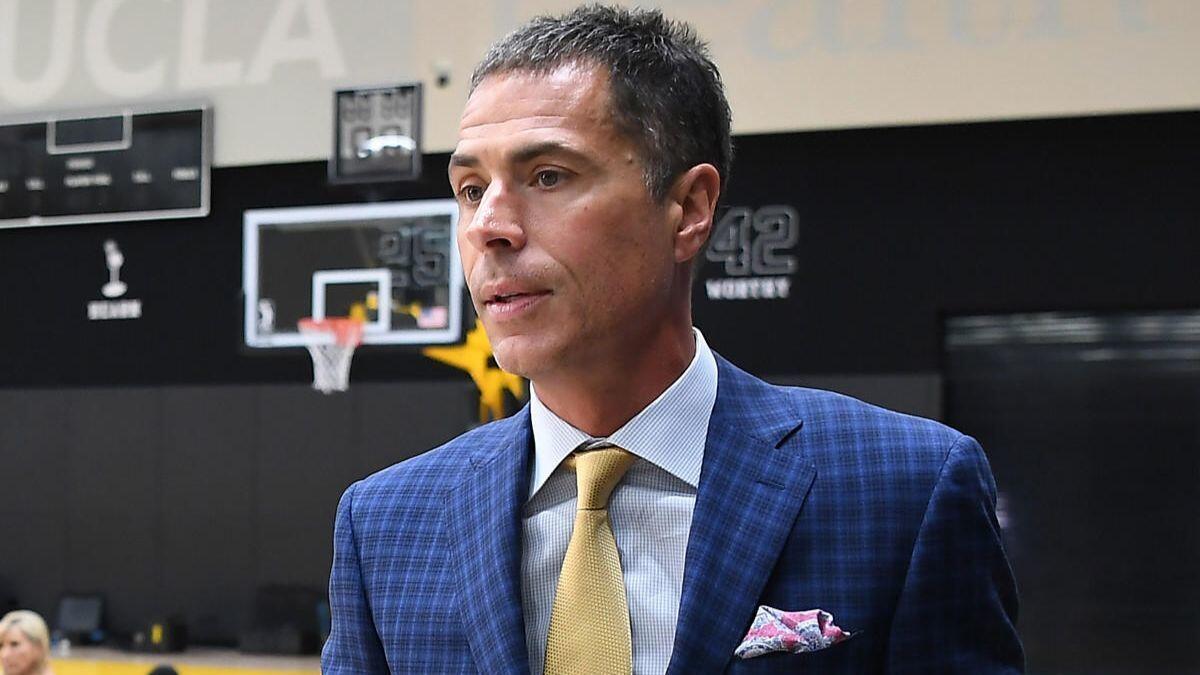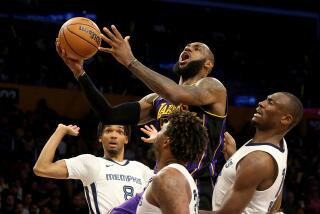Column: Lakers’ Rob Pelinka may not be over his head after all

- Share via
Perception seems to become reality when it’s far more entertaining than what’s actually taking place. Drama is more fun than the mundane when telling tales, so most choose to believe the sensational story while discarding the more boring truth.
That’s usually the case with the Lakers. They’ve found a way to dominate the headlines and airwaves for the past six years despite having the worst winning percentage in the league. That takes some serious Kardashian-level chops to pull off, and the Lakers have provided us with enough unbelievable moments to have their own hit reality show.
But not everything in the daily soap opera that is the Lakers is as entertaining and implausible as it might seem. As NBA free agency begins Sunday, it might be time to acknowledge the front office is not as inept as many thought.
The most fascinating story following the Lakers’ trade for Anthony Davis was that general manager Rob Pelinka didn’t know the rules of the salary cap and had no idea that if the trade was completed immediately after the business moratorium ended on July 6 instead of at the end of the month, the Lakers would not have the necessary salary cap space to sign a free agent to a maximum contract.
That would certainly feed the popular narrative of Pelinka as a bungling team executive who is in over his head. But that was not the case, according to multiple team officials. Say what you will about Pelinka, and the jury is still out on him running the Lakers’ basketball operations, but he was an NBA agent for 20 years. He’s no neophyte.
The Lakers also have Marshall Rader, who is the team’s salary cap and CBA analyst — or “capologist” as some like to call the position. He’s a self-described “salary cap nerd,” who worked in basketball operations in that capacity for the San Antonio Spurs and Indiana Pacers. He also worked on the salary cap and player contracts at the National Basketball Players Assn. and Impact Sports Management, which is the agency that represents Kawhi Leonard.
Your Lakers free agency guide »
The notion that Pelinka and the Lakers had no idea about the impact of the timing of the deal and only found out after seeing it on Twitter or television never made sense.
“Of all the stories out there,” said one Lakers official, “that’s easily the dumbest.”
There’s a difference between not knowing a rule and not caring about it. The timing wasn’t ideal, but the Lakers weren’t going to kill the deal for Davis over it.
The issue for the Lakers from the start was that the New Orleans Pelicans had no intention of keeping the Lakers’ No. 4 pick. They had planned to trade it, which they ended up doing in a draft night deal with the Atlanta Hawks. So it was never really up to New Orleans to delay the trade 30 days, and there was no reason for the Hawks to delay the trade in order to help the Lakers secure maximum free agent money. Not only does that not make much sense for the Hawks, but they also want Virginia’s De’Andre Hunter, whom the Lakers drafted for Atlanta, signed and playing for them in the Las Vegas Summer League next week, not sitting at home for a month just to benefit the Lakers.
So the Lakers needed to find a third team in their deal with New Orleans to take on the contracts of Mo Wagner, Isaac Bonga and Jemerrio Jones while working with Davis’ agent, Rich Paul, to get him to waive his $4-million trade bonus in order to create a maximum salary slot of $32 million by the start of free agency on Sunday. The Lakers accomplished both by Thursday.
Before the perceived salary cap gaffe, there was the much publicized coaching search blunder in which the Lakers missed out on Monty Williams and Tyronn Lue before settling on Frank Vogel.
This wasn’t like when the team hired Phil Jackson in 1999 and again in 2005. The idea, according to team officials, was to sign a coach with playoff experience to a three-year deal and surround him with an “all-star” coaching staff.
Sign up for our Lakers newsletter »
It’s an unusual approach and clearly raised some red flags with Williams, who took a five-year deal with the Phoenix Suns instead, and Lue, who walked away from a three-year, $18-million offer to be the Lakers’ coach. The Lakers ended up hiring Vogel, who took the Pacers from a below-.500 team to the conference semifinals and back-to-back conference finals, falling to the LeBron James-led Miami Heat each time, in his first three full seasons on the job.
The problem is Lue wanted a five-year deal with an annual salary around $8 million and didn’t want to be told who would be on his staff. Lue won a championship with James in Cleveland and deserves to make those demands. The Lakers, however, felt as though they were negotiating against themselves, believing Lue wasn’t in the running for any other NBA coaching vacancies after being fired last season following Cleveland’s 0-6 start. They were also adamant about going after some big names for the coaching staff such as Jason Kidd and Lionel Hollins, who have joined the staff, and renowned Golden State Warriors assistant coach Ron Adams, whom the Lakers have received permission to interview.
No one knows how the Lakers’ plan will pan out. They still have to do something with their salary cap space before the coaching staff can try to lead the Lakers back to the playoffs and to their first championship in a decade. But they do have a plan, and maybe it’s not as bad as some thought.
More to Read
All things Lakers, all the time.
Get all the Lakers news you need in Dan Woike's weekly newsletter.
You may occasionally receive promotional content from the Los Angeles Times.







